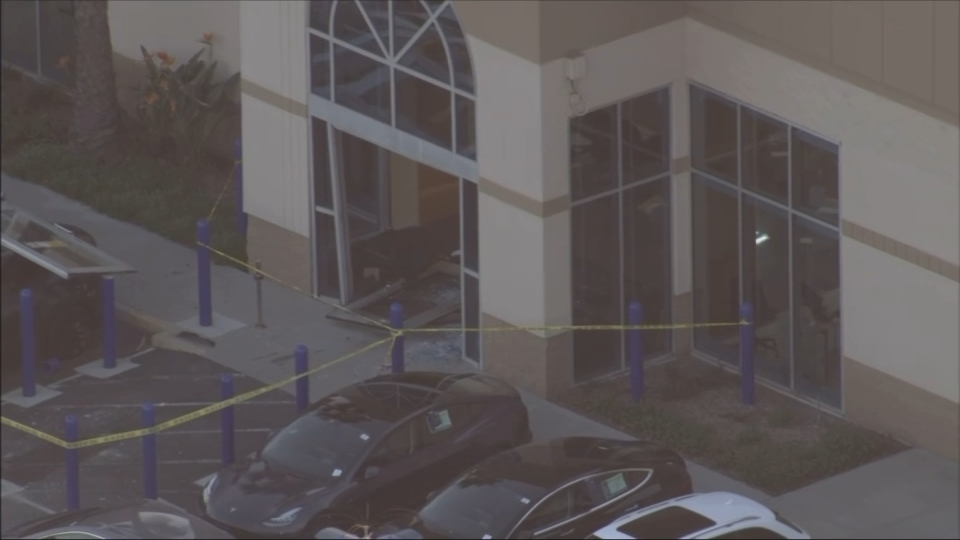Strong winds are in the forecast. Shanna Mendiola has the forecast for Thursday Oct. 24, 2019.
What to Know
- Public safety power shutoffs are being considered for some customers in the SoCal Edison service area
- Shutoffs are possible in some of the area's most high-risk areas
- Strong winds are in the forecast to end the week, raising the risk for wildfires
Power was cut to thousands of Southern Californians Thursday afternoon and more shutoffs are possible this week as hot, dry and windy conditions elevate the threat of wildfires across the region.
Southern California Edison warned its customers about proactive power shutoffs in high-risk fire areas. The alert came ahead of strong winds in the forecast for Thursday and Friday, which can fan brush fires sparked by downed power lines.
"The heat is going up, the winds, and also the fact that the air is going to be so dry -- it's going to elevate that threat," said NBC4 forecaster Shanna Mendiola. "Any fire that does start can spread rapidly."
Part of the San Gabriel Valley east of Los Angeles are included in this round of possible shutoffs.
Here's what to know.
Areas Where Power Has Been Shut Off
Kern County (5,289 customers)
- Tehachapi
- Unincorporated communities of Bear Valley Springs, Stallion Springs
Los Angeles County (1,682 customers)
- Unincorporated areas including Leona Valley, Hughes Lake, Green Valley, Agua Dulce, White Heather, and Boiling Point
Riverside County (133 customers)
- Unincorporated areas including Mountain Center
San Bernardino County (7,246 customers)
- Fontana, Rialto, Rancho Cucamonga, and San Bernardino
- Unincorporated areas including Etiwanda, Grapevine Canyon, San Sevaine Flats, Alta Loma, Chaffey College School
Ventura County (2,710 customers)
- Santa Paula
- Unincorporated areas including Limonera, Somis
What Areas Are Being Considered for Power Shutoffs?
Kern County (over 4,000 customers)
- Tehachapi
- Unincorporated areas including Golden Hills, Old Town, Alpine Forest, Lebec, Kern County, Walker Basin, Bear Valley Springs, Stallion Springs, Keene, Loraine, Sand Canyon, and Twin Oaks, Frazier Park, Pine Mountain Club
Los Angeles County (over 68,000 customers)
- Azusa, Covina, Glendale, Glendora, La Canada-Flintridge, Lancaster, Palmdale, San Dimas, San Fernando, Santa Clarita, Malibu
- Unincorporated areas including Rowland Heights, Vincent, Falling Springs, Leona Valley, Lake Hughes, Green Valley, Lake Elizabeth, Cantillas, Canyon Country, Lakeview Terrace, Agua Dulce, Mint Canyon, Chatsworth, Alta Dena, Acton, Singing Springs, Letteau Canyon, White Heather, and Boiling Point, Portal Ridge, Castaic, Mount Disappointment and Mount Wilson, Forest Park, Bell Canyon, Santa Susana, Santa Susana Knolls, La Crescenta-Montrose, Mount Baldy, San Antonio Heights, West Hills, Stevenson Ranch, Santa Clarita Woodlands Park, Along Angeles Crest Highway, Val Verde, Crescenta Valley
Orange County (over 23,000 customers)
- Irvine, Orange, Villa Park, Lake Forest, Mission Viejo, Santa Ana, Tustin, Rancho Santa Margarita
- Unincorporated areas including El Modena, Trabuco Canyon, and Robinson Ranch, within Irvine Regional Park, Panorama Heights, Cowan Heights, Orange Park Estates, Orange Park Acres, Coal Canyon
Riverside County (Over 50,000 customers)
- Banning, Beaumont, Desert Hot Springs, Palm Springs, Hemet, San Jacinto, Menifee, Perris, Corona, Temecula
- Unincorporated areas including Banning Pass, North Palm Springs, between Beaumont and Banning, Riverside County, San Jacinto, Lake Perris North Shore, Lakeview, Nuevo, Lake Elsinore, Temecula, Lakeview Hot Springs, Cabazon, Med Valley, Goodhope, Eden Hot Springs, Juniper Flats, Gilman Hot Springs, Big Oaks Canyon, Owl, portions of Desert Hills Outlet Mall, Mountain Center, Temecula, Banning SW of Cabazon and NE of Banning, Whitewater Canyon
San Bernardino County (Over 63,000 customers)
- Big Bear Lake, Fontana, Highland, Rancho Cucamonga, San Berndardino, Rialto, Upland, Chino, Chino Hills, Hesperia, Yucaipa
- Unincorporated areas including southern Morongo Valley, Lytle Creek, Etiwanda, Grapewine Canyon, San Sevaine Flats, Alta Loma, Chaffey College School, Verdemont, Hudson, Ridgeline, Cajon, Arrowhead, Phelan, Devils Canyon, Serrano Village, Kendall, University, Arrowhead Farms, North Park, San Bernardino High School, Shandin Hills, Rim of the World, Del Rosa, NE Sterling, Nena, Big Oaks Canyon, Snow Peak, Devore Heights, Devore, Wildwood Park, Cedar Pines Park, Valley of Enchantment, Crestline, Silverwood Lake, Twin Peaks, Agua Fria, Muscoy, Carey, Lincoln Crest, Leona Valley, Las Plazas, Alessandro, Roosevelt, Mount Vernon, Highland, Running Springs, North of Lake Arrowhead, San Andreas, Small Canyon, Patton, Amber Hills, Mill Creek Canyon, Angelus Oaks, Pinezanita, Converse Flats, south of Cushenbury, Doble, Upper Holcomb Valley, Ferrara, Hovatter, Yucaipa Valley, Oak Hills, Lugo, Summit Terrace, Antelope Valley
Ventura County (Over 76,000 customers)
- Camarillo, Fillmore, Malibu, Moorpark, Ojai, Santa Paula, Simi Valley, Ventura, Thousand Oaks, Oxnard
- Unincorporated areas including El Rio, Santa Susana Mountain, Sespe, Oak Village, Bardsdale, Lotus Canyon, Cavin, Saticoy, Limonera, Somis, Buckhorn, Piru, Bardsdale, Bell Canyon, Santa Susana, Santa Susana Knolls, Lockwood Valley, upper Ojai, near Simi, Santa Rosa, Haines, Fagan Canyon. North Fillmore, Solromar
Why Shut Off Power?

Most of the deadly California fires over the past several decades, including the fire that destroyed the town of Paradise in Northern California, have been the result of power lines in high-wind situations.
Add in Southern California's infamous Santa Ana winds, and you have extermely volatile conditions. Santa Ana winds, which can fan flames sparked by downed power lines, are expected to pick up Thursday during one of the worst times of the year for wildfires.
The winds will develop by early Thursday and continue through Friday.
Where Are the Possible Outage Areas?
For a detailed listing of all areas affected and maps to check if you may face a proactive shutoff, visit SCE's Public Safety Power Shutoff page.
News
Top news of the day
Only SoCal Edison customers are affected by the shutoffs. Customers in the LADWP service area will not face power shutoffs. The LADWP does not shut off power due to strong winds, in part because the highly urbanized area has fewer wildfire prone areas.
How Proactive Power Outages Work
Meteorologists and other SoCal Edison staff members use high-resolution weather data maps and other tools to monitor extreme fire weather. SoCal Edison also uses weather stations, historical data and fire monitoring cameras to determine fire potential.

If conditions warrant, the utility will shut off power in high-risk areas. Customers can receive notifications about outages in their area through emails, text or phone calls. The utility will alert first responders, local governments and customers of power shutoff.
Here are some of the factors the utility considers before declaring an outage.
- High winds, including red flag warnings
- Low humidity
- Dry vegetation that provide fire fuel
- On-the-ground observations
- Fire threat to electric infrastructure
- Public safety risk
An initial notification is sent out about two days before a possible shutoff to warn customers. A second notification will be sent a day before, then notifications are sent when power is shut off and when it's restored. Restoration is based on when weather conditions are deemed safe.
Customers can view this map to see whether they're in a high-risk area.
Parking Restrictions due to Fire Weather
Due to the critical fire conditions, the city of Los Angeles will enact red flag parking restrictions at 8 a.m. Thursday in Very High Fire Hazard Severity Zones.The restrictions are put in place in an effort to keep streets clear of parked vehicles to ensure fire apparatus can reach brush fires, while also clearing a path for residents who may need to quickly evacuate a fire area.
Why Are Santa Ana Winds So Dangerous?
The fire-whipping winds are produced by surface high pressure over the Great Basin squeezing air down through canyons and passes in Southern California's mountain ranges. They're common in the fall and have a long history of fanning destructive wildfires in the region.
Fall is historically the worst time of the year for damaging wildfires in California. Seven of the state's 10-most destructive wildfires have occurred in October and November.
Through mid-October, more than 4,800 fires burned nearly 47,000 acres in California. During the same period last year, 5,155 fires burned a staggering 631,900 acres. California's five-year average for that timeframe is 5,109 fires and 372,344 acres burned.



